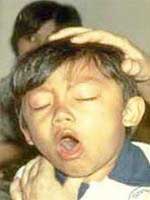Long-term cough in children
 Long-term cough is a respiratory infection caused by a bacteria that causes a long cough on Bordetella. The disease is described with a lot of coughing characteristics, leading to a coughing when the patient breathes.
Long-term cough is a respiratory infection caused by a bacteria that causes a long cough on Bordetella. The disease is described with a lot of coughing characteristics, leading to a coughing when the patient breathes.
Although long-term coughing can occur at any age, the object it usually attacks is the unvaccinated child and the infant under 1 year of age. According to statistics, about 40% of the long-term cough infections occur in children under 1 year of age, 15% occur in children over 15 years old. Half of the long-term cough deaths are among infants under 1 year of age, and serious complications also occur in this group.
Over the years, long-term coughs are also increasing in adolescents and adults. Early vaccination can prevent this disease.
Signs and symptoms
The first symptoms of a long-term cough are often similar to the common cold, including:
- Runny nose
- Sneeze
- A mild cough
- A mild fever
After about 1 to 2 weeks, symptoms of dry cough, burning, turn into a cough, each episode can last more than 1 minute, can cause children to become red or colored skin like bleeding. At the end of each cough, the child may make a coughing sound when breathing or may vomit. Between coughs, children often feel comfortable.
The spread of disease
Long-term cough has a high risk of spread. Bacteria are spread from person to person through fluid from the nose or mouth of an infected person when an infected person coughs, sneezes or laughs. Others may then become infected by inhaling these fluids or when they attach to their hands and they accidentally touch their noses or mouths.
Infected people often spread the disease in the early stages of the disease to about 2 weeks after they start coughing.
Incubation period
The incubation period is usually 7-10 days, which can last up to 21 days.
Time to prolong the disease
Long-term coughing can cause many long-term symptoms. The first symptom is that children often have a cold for 1-2 weeks. Then cough for 2-4 weeks, sometimes longer. The final stage consists of several weeks to recover slowly. In some cases, it may take many months for children to recover completely.
Prevent disease
Long-term cough can be prevented by vaccination, with 5 injections for children until the child is 6 years old. Experts believe that up to 80% of family members who are not vaccinated have a long-term cough if they live in the same household as someone with the disease. For this reason, anyone who has close contact with a long-term cough patient should also take antibiotics to prevent spreading the disease. Young children who do not receive 5 doses of vaccine may require a booster dose if there is a sick person in the home.
WALL VY
- Properly handle when a child coughs from the sky
- Prevent cough before cold weather
- Cautions for treating cough for young children
- Long-term harm when children sit a lot on a stroller
- Signs of cancer are often ignored by you
- Decoding your baby's cough: Causes, symptoms and treatments
- Good tips for relieving cough immediately
- Should cough medicines be used for children under 2 years old?
- Smoking during pregnancy causes long-term effects
- Don't expect to cough because of colds
- Should pregnant women get vaccinated against pertussis?
- Mommy eating snacks harms long-term health for children
 Green tea cleans teeth better than mouthwash?
Green tea cleans teeth better than mouthwash? Death kiss: This is why you should not let anyone kiss your baby's lips
Death kiss: This is why you should not let anyone kiss your baby's lips What is salmonellosis?
What is salmonellosis? Caution should be exercised when using aloe vera through eating and drinking
Caution should be exercised when using aloe vera through eating and drinking